It is well-established that, today, most consumers see food as having a central role in their lives, that their purchasing preferences are driven by informed choices, and that they often opt for foods from sustainable producers and sustainable supply chains. In this regard, alfalfa can truly make a difference as a superfood that, while not found directly on supermarket shelves, transforms animal diets into highly nutritional foods.
Sustainable nutrition: an integrated vision
Until recently, the environmental impact and nutritional value of food were considered separately, in terms of CO₂ footprints, land consumption and water use, on one hand, and nutritional value, on the other. However, recently, interdisciplinary scientific approaches have brought these worlds together, by simultaneously analysing how much useful nutrition a given food provides and at what environmental cost.
The research has focused on the study of ‘functional units’, scalar parameters that represent the nutritional function of a food, such as its energy, protein and lipid content. These then allow foods to be compared and standardised in relation to human needs.

An invisible journey, from field to table
Proteins are fundamental nutritional components that provide the body with amino acids, which are molecules necessary for the construction of tissues. As is well known, not all proteins have the same nutritional value. Animal proteins, for example, have a more complete amino acid profile, and are more easily digestible, which are essential characteristics given the vulnerability of food production to climate change.
For such reasons, feeding animals high-quality raw materials, such as alfalfa, improves the nutritional profile of the resulting milk, meat and derivatives, while reducing the environmental impact of farming.
When we think about milk, meat and eggs, we often focus only on the final product. But their extraordinary nutritional quality has much deeper roots, out there in the fields. Alfalfa, a plant rich in high-quality proteins, essential amino acids, minerals and vitamins, is a super-forage that feeds cows, sheep and chickens, transforming their diets into products of the highest biological value. Three recent studies in agro-environmental and food biotechnology have confirmed this invisible link:
🌿 Assessment of Dietary Protein Quality in Human Nutrition using the Digestible Indispensable Amino Acid Score DIAAS: to measure protein quality, which is found to be higher in animal-based foods.
🌿 Identification of equitable and sustainable agri-food systems at a global level using the Nutritional Life Cycle Assessment nLCA: to assess not only environmental impact, but also nutritional efficiency;
🌿 Food rating based on global health priorities using the Nutritional Value Score NVS: to assign nutrient density scores, highlighting milk, meat and eggs as among the best foods for humans.


Alfalfa: a crop that works for us
Incorporating alfalfa into livestock rations reduces the overall carbon footprint of the supply chain, considering both direct and feed-related emissions, and offers consumers sustainable foods in line with the principles of agroecology.
Another important consideration is that by using alfalfa in feed formulas and farm rations, the need to import GMO protein raw materials is reduced, along with everything that this entails in terms of deforestation, the environmental impact of logistics, and food dependency.


